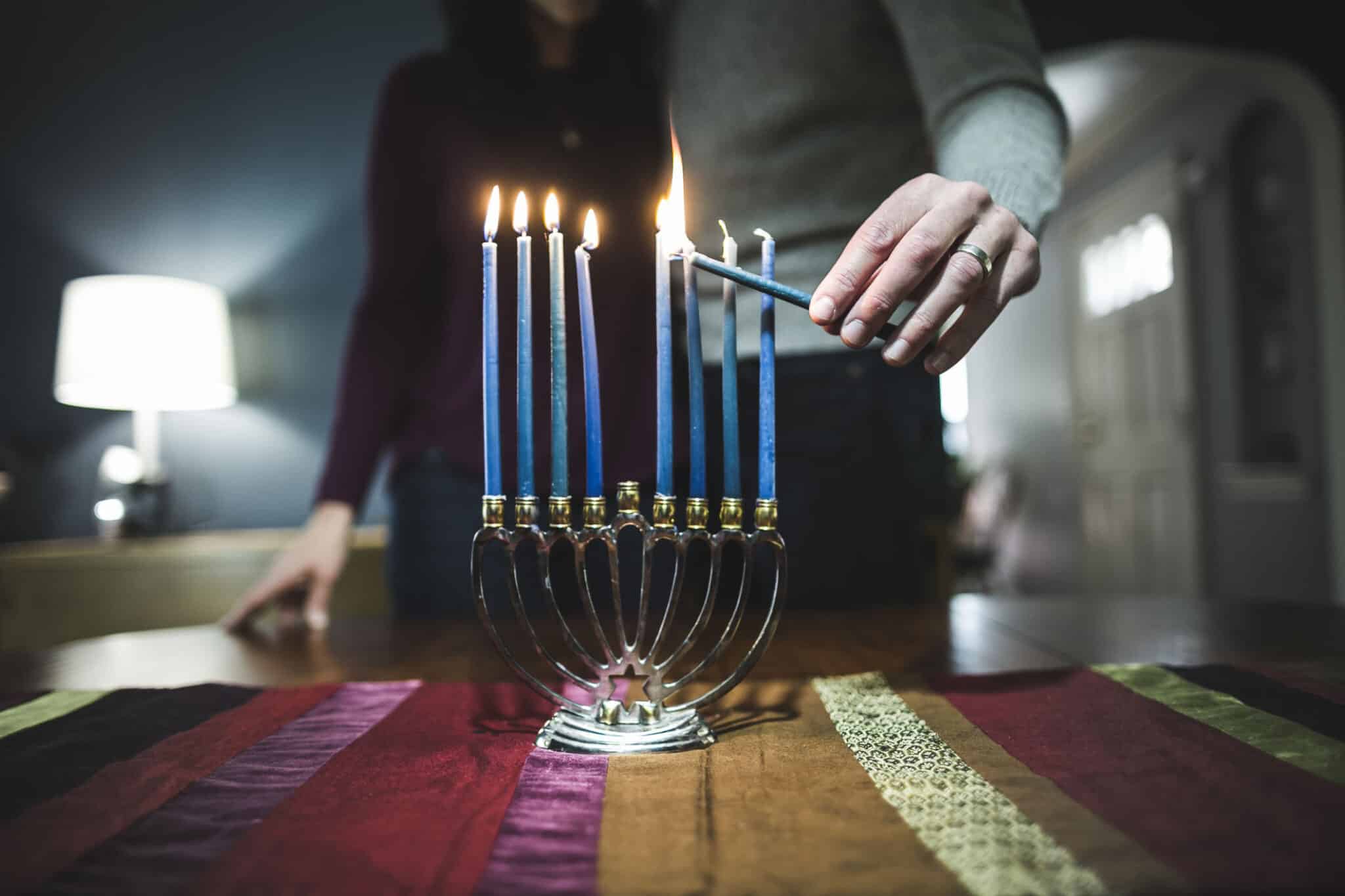 The Good Brigade/Getty Images
The Good Brigade/Getty Images A few weeks before Hanukkah, my wife and I traveled with our child and her middle school toWashington, D.C. for an Israel solidarity rally. Surrounded by thousands of fellow Jews I felt comfortable in my religious heritage. But once we returned home to New York the bullish facade lifted, leaving me searching for cheer in a holiday season marked by anxiety.
Growing up in a mostly secular household, I found relief in the eight nights of Hanukkah. Its tradition of gift-giving, jelly donuts, candle lighting and dreidel games was a way for me to be Jewish without the heaviness of synagogue services conducted in a language I did not understand. The festival of lights also allowed me to participate in the Christmas season’s celebratory vibe, lessening the awkwardness I felt navigating a Christian-centric world.
After getting married and becoming a father, I became more focused on religious engagement. Along with my wife and child I attended synagogue every Shabbat and celebrated all the Jewish holidays.
We also visited Israel often to see my wife’s family. These trips have made us feel a deep connection to the Jewish State.
I was thankful to be raising a family in a country with low levels of anti-Semitism, and to see Israel grow into an economic and military power. When I placed our lit Hanukkah menorah in our window, I did so as an expression of our good fortune to be living in a “Jewish golden age.”
Even though we have Israeli nieces and nephews in military uniforms, my household will emphasize Hanukkah’s escapist aspects. After two months of cycling through anger, fear, and sadness, we need the holiday’s lightness.
When it was originally added to Judaism’s religious calendar, Hanukkah was all about the Maccabees. They won a war against the Seleucids, who had desecrated the temple and outlawed Jewish worship.
Centuries later, rabbis added the legend about the small container of oil used to light the menorah during the temple’s rededication miraculously lasting eight days. Judaic scholars believe that the oil story was added to draw attention from the military victory, in which God played no role, and highlight a miracle that could only involve the hand of providence. The oil story also distracts from the fanatical Maccabees–who slaughtered fellow Jews they deemed insufficiently religious.
In celebrating Hanukkah, Israelis focus more on the military victory than do American Jews. They relate the Maccabees’ triumph to their own wars of survival, with Prime Minister Netanyahu fondly calling the I.D.F. “the new Maccabees.”
While a militaristic mindset may have opened Israeli eyes to the war behind the oil legend, a cousin told me that his country’s glorification of the Maccabees reflected a dangerous triumphalism — an overconfidence that encouraged his fellow citizens to dismiss the impracticality of ruling over millions of Palestinians.
I had my own blind spot. Before 10/7 I was primarily concerned with white supremacy and downplayed anti-Semitism on America’s political left.
Lulled by multiculturalism’s facade of tolerance, I was startled by protestors chanting “From the river to the sea” and pro-Hamas sentiment on campus. Meanwhile the alt-right is writing a new chapter on anti-Semitism through the “white replacement theory” being peddled by Elon Musk and Tucker Carlson. Jew-hate is trending on both sides of the political spectrum.
I imagine that in many Jewish households the military victory that Hanukkah celebrates will get equal billing with gift-giving and jelly donuts. Tales of heroism can provide comfort in times of vulnerability.
Nonetheless the current crisis has not dismantled all the guardrails protecting Jewish life. Most Americans roundly reject the alt-right’s hateful ideology, and the Jewish State has bipartisan political support. America is still good for the Jews.
Meanwhile, Israel is still far stronger than her enemies. The Jewish State will not be dislodged anytime soon.
But over the past two months my comfort with my Jewish-American identity has morphed into wariness. Similarly, it is unclear what type of country I will be visiting the next time I see my Israeli relatives. All I know is that it will be a less confident, more uncertain place.
Over the past two months my comfort with my Jewish-American identity has morphed into wariness. Similarly, it is unclear what type of country I will be visiting the next time I see my Israeli relatives. All I know is that it will be a less confident, more uncertain place.
No matter the fallout from 10/7, the Jewish calendar continues to turn and Hanukkah is nearly here. Even though we have Israeli nieces and nephews in military uniforms, my household will emphasize Hanukkah’s escapist aspects. After two months of cycling through anger, fear, and sadness, we need the holiday’s lightness.
One of our family traditions is to wear three-dimensional eyeglasses that distort our candle flames into funny shapes. Yet this year, while placing our menorah by our window, I will be sure to remain clear-eyed while looking at the fire raging outside.
Ben Krull’s work has appeared in The New York Times, Washington Post, New York Daily News and other publications.






















 More news and opinions than at a Shabbat dinner, right in your inbox.
More news and opinions than at a Shabbat dinner, right in your inbox.